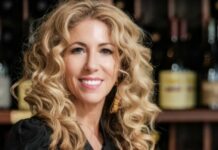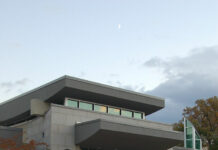
Rabbi Eitan Cooper was raised in a rabbinical home, with his father serving as a Conservative pulpit rabbi for many years, and when he was younger, Cooper did not intend to follow in his father’s professional footsteps when he got older.
That attitude changed around a year after Cooper graduated high school and spent a year in Israel, where his aspiration to become a rabbi became apparent.
Cooper is now finishing his fifth year as the assistant rabbi at Congregation Beth Sholom in Potomac, where he’s had a wonderful time serving the people of the area and integrating into the community while raising a family.
Can you tell me about your background and what led you to your current position?
I was raised in a rabbinic home. My father is a Conservative rabbi — he was a pulpit rabbi for a number of years. And I grew up basically thinking I did not want to be a rabbi. Because as much as I appreciated my parents and everything they had given to me and I really loved my childhood in many ways, I decided I was decidedly against creating a rabbinic home of my own one day and becoming a rabbi. And then, once I left my home, when I was 18 years old and I graduated high school, it took me about a year, maybe less, to determine that I did want to be a rabbi. And I think I arrived at that conclusion when I was in a gap year in Israel in yeshiva. I think it took actually seeing all of the rabbis who became my teachers and my role models in my year in Israel, and then all the many other subsequent mentors and rabbis, and I was blessed, really, truly blessed, to have them in my life. I wanted to model my life after the life of service to the Jewish people that all of my mentors were committing themselves to and I felt really inspired to want to do the same thing.
Can you tell me about what drew you to Beth Sholom and why you decided to take that position?
Number one, I was really drawn to the idea of working at a large, vibrant synagogue with a long history and a robust and involved membership. It’s a privilege and a blessing to be able to have that opportunity to grow in the rabbinate as an assistant rabbi and not to immediately jump in … To be an assistant rabbi at a large congregation, I think gives you a lot of exposure, a lot of experience and a lot of mentorship opportunities. So, that was one thing that was attractive. Also, Beth Sholom is the kind of synagogue that I would want to attend if I were not the rabbi there. Getting to know the synagogue through the interview process, it became immediately clear to me and to my wife that we could find a home here and would feel very much a part of this community, both in terms of where they were as a Modern Orthodox synagogue and really matching up with our own values as Modern Orthodox Jews.
What has the experience of raising a family in this community been like for you?
It’s been wonderful. We just had our fourth child. And since the pandemic, there have been several families, dozens of families, that have moved to Beth Sholom with children that are the same age as our children. So, it’s been wonderful for the synagogue. And it’s been wonderful for us on a personal level to really get to know all these new families and for our children to make friends. And it’s just been a wonderful place for us to call home.
What is it that drives you to continue doing this work?
I’m driven by a desire to serve the Jewish people and to be part of this robust community, both as its rabbi and just to facilitate connections amongst people. And to really be part of those meaningful moments in everybody’s life, it’s a true privilege to be able to do that. And I think that what really drives me is just growing our community and making it as warm and welcoming and vibrant and engaging
as possible.
What is it that you get out of being a spiritual leader for this community?
I get a rare opportunity to do meaningful work as part of my job, and I consider myself really lucky and blessed to be able to do what I do professionally and have that be my job. That’s really a blessing. Another thing I get is that there’s no shortage of meaningful opportunities to help our community and to serve our community.
How does your Jewish identity impact the work that you do?
My Jewish identity is all about finding and building strong communities that can be places where people find meaning. And that’s essentially what I’m trying to do at Beth Sholom and what I’m trying to be part of at Beth Sholom. And so, I would say that my Jewish identity and my professional identity are in many ways, one
and the same.





